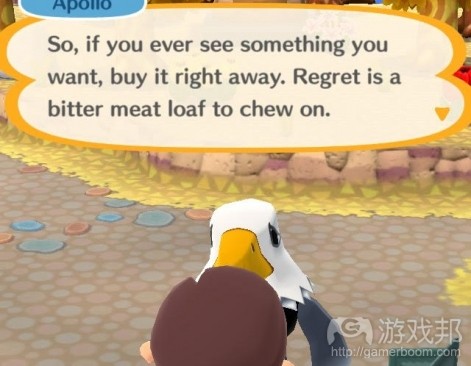以产品体验的角度谈《动物之森:口袋露营》是如何盈利的
以产品体验的角度谈《动物之森:口袋露营》是如何盈利的
原作者:Matt Suckley 译者:Willow Wu
欢迎回到In-App Purchase Inspector,在这里我们会以消费者的视角,定期测评一些F2P游戏。
每期文章,我们都会考虑游戏中IAP的诱因、压力、它们的感知价值、IAP带来的扩展内容还有整个游戏体验的评估。
最终目的就是看看这游戏究竟值不值得我们砸钱,不花钱的游戏体验是否也能让玩家感到满足。
这次我们测评的是《动物之森:口袋露营》——任天堂发行的第四款移动应用,同时也可以说是最受期待的产品。
目前它在澳大利亚测试发行,预计在11月底就能全球正式发行。
正式发行在即,我们看到的这些游戏内容很有可能会成为正式版。
跨平台要谨慎
任天堂宣布跟DeNA合作,要把他们的游戏移植到移动平台,《动物之森》就是其中备受关注的一个。
这个温馨的村庄模拟游戏系列虽然没有马里奥和塞尔达系列那么火爆,但是从它的玩法、节奏来看,《动物之森》系列也是任天堂的上乘之作,是最适合转化为F2P模式的游戏。
这个系列在早先就尝试过让玩家过一段时间后再返回游戏中,而现在这种玩法在很多F2P游戏中都有应用。
它的实际玩法就是设计一个家、收集资源、跑腿,在移动平台上玩这个游戏并没有什么不顺手的地方。
这就是为什么《动物之森:口袋露营》不需要像马里奥和火焰纹章系列那样更改游戏的原有设计,为的是更好地适配移动平台。
快乐的野营者
游戏本身也没有因为F2P的盈利策略而变质。
在刚刚开始玩游戏的时候,摘完苹果你会发现还要等3小时苹果才会再长出来,有些玩家可能就会开始害怕《动物之森:口袋露营》可能是个相当耗时间的游戏。
然而,开发者们已经将游戏中的计时器缩减到最少了。在之前付费版本的《动物之森》中,要花费整整一天才能结出新果实。
总的来说,完全不用担心《动物之森:口袋露营》会因为这种等完又等的玩法成为一个折磨非付费玩家的游戏。
这些跟原作一样的互动方式让《动物之森》成为一个更适合F2P结构、而且是更正规的F2P游戏。和小动物们互动、提升友谊等级,这也会有助于提高你的整体级别,每次升级系统都会赠予奖励。
钟声响起
《动物之森:口袋露营》有两种货币:Bells就是游戏中经常使用到的货币,跟一般F2P游戏中的软货币一样,在玩游戏的过程中就可以的得到,还可以通过出售物品获得,而Leaf Tickets则是游戏中的硬货币。
Leaf Ticket是以礼包的形式购买:从1.49澳元买20张到62.99澳元买1200张。完成任务也会得到不少的Leaf Tickets。
对于玩家来说,它也是个十分有用的道具。游戏中的捕鱼、捉虫小游戏就可以用到,比如说你可以花15张Tickets买特殊的渔网和蜂蜜,会更容易抓到特殊的品种。
在你刚开始玩游戏的时候,系统会给你推荐一个相当划算的新手礼包:包含40张Leaf Tickets、两种不同的渔网、还有一些蜂蜜,这些只要1.49澳元——按这个价格你一般只能买到20张Leaf Tickets。需要注意的是这个礼包限时72小时,过了这个村就没有这个店了。
另外,你还可以用5张Leaf Tickets购买肥料,直接跳过上面提到的3个小时的等待时间,让果树立刻结果。
游戏中还有个地方Shovelstrike Quarry,在这你可以挖到一些珍稀矿产资源和Bells。你可选择等几个小时后进去一次,或者找至少五个小伙伴才可以进去——很明显这是为了增加玩家的社交互动,让更多人来玩这个游戏。如果找不到朋友而你非进去不可的话,那就乖乖交出20张Leaf Tickets吧。
进入之后,玩家要选择五块石头,每一块岩石都含有不同的矿物。
要从这么多石头中挑出五个,各种矿物的价值也有所不同,这就跟“吃碰饭”差不多。虽然机制不太一样,但是本质上是跟抽卡系统差不多的。
相似而不同
在游戏的初期阶段,你可能觉得《动物之森:口袋露营》没有那么多F2P套路,但是之后你就会觉得其实多多少少还是有的,而且不仅是上文所提到的那些例子。
《部落冲突》向世人展示了建筑工人也可以是盈利点——玩家付一次钱就能增加一个建筑工人,增加一倍的生产力。
《动物之森:口袋露营》也应用了类似的做法:游戏默认是一次只能制作一样东西。你可以花费80 Leaf Tickets激活第二个制造任务——大概是5澳元,可能相比游戏中的其它消费有点高,但是长期看来绝对是有益的。
玩类似《部落冲突》这样的游戏,如果不花钱,游戏中无处不在的计时器对你来说简直就是一种无尽的煎熬。
《动物之森:口袋露营》的早期阶段并不是这样的,大多数物品都能在1-3分钟内完成。但是测试发行版本还没有足够的内容来评估游戏规模会发展到哪种程度。
但是综合考虑,这些早期表现还是符合原作粉丝对《动物之森》手游版的期望:忠于原作系列,在移动平台上操作流畅,而且没有利用F2P特性对玩家耍阴招。
本文由游戏邦编译,转载请注明来源,或咨询微信zhengjintiao
Welcome back to the In-App Purchase Inspector – our regular look at free-to-play games from the consumer’s perspective.
In each instalment, we consider the incentives or pressure applied to make in-app purchases, their perceived value, the expansion offered by IAPs and the overall value of the experience.
The end goal is to see whether the game makes a good enough case for us to part with our cash, or whether players are content – or engaged enough – to ‘freeload’.
This time we’re taking a look at Animal Crossing: Pocket Camp, Nintendo’s fourth – and arguably most anticipated – mobile release.
It’s currently soft-launched in Australia, with a global release set for the end of November.
With the game just around the corner, these impressions are very likely to be indicative of the final version.
Cross carefully
From the minute Nintendo announced its partnership with DeNA to bring its franchises to mobile, Animal Crossing was the one that stood out.
The gentle village sim series lacks the obvious star power of Mario and Zelda, but the manner and rhythm of its gameplay always stood out in Nintendo’s stable as being the most suited to free-to-play conversion.
Here was a series whose previous entries had already experimented with having players return regularly over a long period of time, encouraging play patterns we now associate more with free-to-play.
And as for the actual gameplay – designing a home, collecting resources and running errands – it all feels very much at home on mobile.
This is why Pocket Camp didn’t require the same fundamental design changes that were required when Mario and Fire Emblem came to mobile, and it’s all the better for it.
Happy campers
Nor has the game been meaningfully changed by free-to-play monetisation.
After picking some apples in the early stages and realising it then takes a further three hours for the tree to bear fruit again, some might fear that this is a sign of things to come.
However, the timers are kept to an absolute minimum and, as we’ve already pointed out, it takes fruit a full 24 hours to regrow in previous, premium Animal Crossing games.
And generally, any worries about Pocket Camp becoming a grindy experience of interminable slowness for non-paying players are very quickly quelled.
The same interactions that always defined Animal Crossing become part of a more formalised, F2P-friendly structure – interacting with animals increases a friendship level, which in turn contributes to an overall levelling system that gives rewards at each increase – but you’d be hard-pressed to find a cynical strain.
Ringing bells
Pocket Camp has two currencies: long-standing series currency Bells are earned in much the same way as usual, through general play and selling items, while Leaf Tickets are introduced as the game’s hard currency.
Leaf Tickets come in bundles ranging from 20 for 1.49 Australian Dollars to 1,200 for A$62.99. A good supply can also be ensured by completing objectives.
As for their actual use, Leaf Tickets come in handy in a few ways. As part of the fishing and bug-catching minigames, for instance, specific nets and honeys can be bought for 15 Tickets apiece to stand a better chance of catching certain species.
There’s also a rather good starter pack available for your first 72 hours, featuring 40 Leaf Tickets, two different kinds of fishing net and some honey for A$1.49 – which only gets you 20 Tickets under regular pricing.
Elsewhere, five Tickets can buy you some Fertilizer to bypass those aforementioned three-hour wait timers and make a tree bear fruit again instantly.
Then there’s Shovelstrike Quarry, an area in which high-value minerals and Bells can be mined. It can be entered only once every couple of hours, either for free with a minimum of five other players – one of the game’s more explicit social hooks – or in return for 20 Leaf Tickets.
Once there, the player gets to choose five rocks to mine, each one containing a different kind of mineral.
With many more than five rocks to choose from and a great variation in the value of the minerals on offer, this is a case of pot luck. While framed differently, it is in effect a kind of gacha system.
The same but different
This isn’t the only example of Animal Crossing: Pocket Camp sticking more closely to the F2P playbook than it may initially appear.
Clash of Clans was the game that showed the world the potential in monetising a second builder, by offering the player a chance to effectively double their in-game productivity with a single purchase.
Pocket Camp has a similar system in place when it comes to crafting, where by default only one item can be crafted at any one time. A second slot can be opened up for 80 Leaf Tickets – a larger investment of around five Australian Dollars in real money, but one with a longer-term benefit.
However, games like Clash of Clans wear the player down with long wait timers to the extent that continuing without this purchase feels like a huge slog.
This isn’t the case in the early stages here, with most items crafted in a mere one to three minutes, but the game hasn’t been available long enough to assess the extent to which this scales up as you progress through the levels.
But all things considered, early impressions suggest that Pocket Camp is Animal Crossing on mobile as the fans wanted: true to the series, and very much at home on mobile, but without bowing to the uglier side of free-to-play.(source:pocketgamer.biz )








































 闽公网安备35020302001549号
闽公网安备35020302001549号